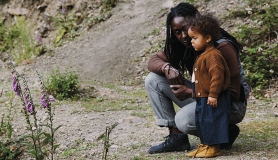At times, raising a family requires us to put all the received wisdom, all the books and the well-meaning advice out the window, and trust our instincts. But that isn’t to say that it’s always easy. For some, it is second nature; their instincts are honed to perfection from years of ‘listening to the inner voice’. For others (including me), it can be more complex. Intuition seems to say one thing, but the influence of others is strong. We can worry that our instincts are in fact emotional responses to a given situation. This becomes especially problematic when our instincts tell us to go against ‘received wisdom’. Or when the consequences of our decisions have a huge impact, such as in choosing one route or another in our child’s health.
A mother’s instinct
Parents might be concerned that they come across as ‘neurotic’. This happened to a relative of mine who was convinced something wasn’t right with her new-born son. Doctors and midwives dismissed her concerns and she admitted that eventually she felt they had written her off as a neurotic new mother, particularly as she had a history of depression. Before she knew it, they were trying to medicate her. It turned out her son had a fault with the structure of his heart, and shortly after his birth was rushed to Great Ormond Street Hospital. (It healed naturally and he is now fine, as is she.)
One of the major obstacles to healthy natural birth is the attendant health professionals’ reliance on machines, rather than through watching and listening to the mother. We have created a society in which we value the opinions of professionals, or the readings from machines, more than we value instinct or intuition.
Instinct works 90% of the time
And yet evidence shows that instinct is a powerful tool. A 2012 study published in the journal Proceedings of the National Academy of Sciences revealed that, forced to choose between two options based on instinct alone, participants made the right call up to 90 per cent of the time. Professor Marius Usher of Tel Aviv University’s School of Psychological Sciences, who undertook the research, remarked; “Intuitively, the human brain has the capacity to take in many pieces of information and decide on an overall value. Gut reactions can be trusted to make a quality decision.”
Sylvia Clare, in her book Trusting Your Intuition: Rediscover Your True Self to Achieve a Richer, More Rewarding Life, writes that: “Intuition is the highest form of intelligence, transcending all individual abilities and skills”. She goes on to describe the different forms intuition comes in:
- “a sudden flash of insight, visual or auditory
- a predictive dream
- a spinal shiver of recognition as something is occurring or told to you
- a sense of knowing something already
- a sense of deja vu
- a snapshot image of a future scene or event
- knowledge, perspective or understanding divined from tools which respond to the subconscious mind”
Listening to the inner voice
When making decisions about our children, our intuition can be our most powerful tool. When we slow down and really tune into our child and their needs, insights arise. I experienced this recently when my son was ill with a bad bout of tonsillitis and there was considerable pressure from various sources to give him antibiotics. For a while, I felt confused and disconnected. Then, in what Sylvia Clare describes as a “sudden flash of insight”, I found myself making him sage tea, although I couldn’t remember how I’d obtained the information that it might be useful. My instincts told me to avoid the antibiotics and support his healing responses, despite a high fever. But to do this, I had to put aside the ideas and opinions of others, and tune into my son and my own intuition. It is the same when we make big decisions like whether or not to vaccinate.
Getting in touch with your intuition
Tuning into your instincts isn’t always the easiest task, but one which will bring untold rewards to your family. By nurturing your innate inner voice, you are also connecting with the inner voices of your children. Those moments when you understand what they’re feeling without them needing to say anything, or sense that you are needed when your child is in another room, say, will become more frequent. People who regularly tune into their instinct, or inner voice, report a deeper sense of connection between them and their loved ones. I often look to my pets for guidance; without words, they know when a situation is positive or negative, or when a visitor is someone to be trusted or not. The complexity of language can often simply muddle us: this is especially true when we’re trying to make a difficult decision and have read lots of books and heard lots of advice, and our heads are literally ringing with WORDS! Away from the phrases that catch in our minds, there is a deeper sense – which manifests itself in one of the ways Sylvia Clare describes above – that holds the answers to the questions we seek.
People who teach the skills necessary to enhance intuition often speak of the benefits of meditation to quiet the ‘monkey mind’. Once our internal chatter is calmed, we are able to act from a place of innate knowledge and wisdom. The feeling when you tap into your instincts is unmistakable – a bit like tuning in to universal energy/the Divine/ God/ Goddess/ whatever you like to call it.
We live in an era of communication – of many, many people telling us how to do just about anything we can think of, including parenting. In the midst of that, it feels good to sometimes take back your power, and listen to that inner voice that knows exactly what to do.
Read more:
Intuitive Parenting: Listening to the Wisdom of Your Heart by Debra Snyder
Intuition And Beyond: A Step-by-Step Approach to Discovering the Voice of Your Spirit: A Step-by-step Approach to Discovering Your Inner Voice by Sharon Klinger
Trust Your Vibes: Secret Tools for Six-Sensory Living by Sonia Choquette
You Do Know: Learning to Act on Intuition Instantly by Becky Walsh
The Intuitive Way: The Definitive Guide to Increasing Your Awareness by Penney Peirce






